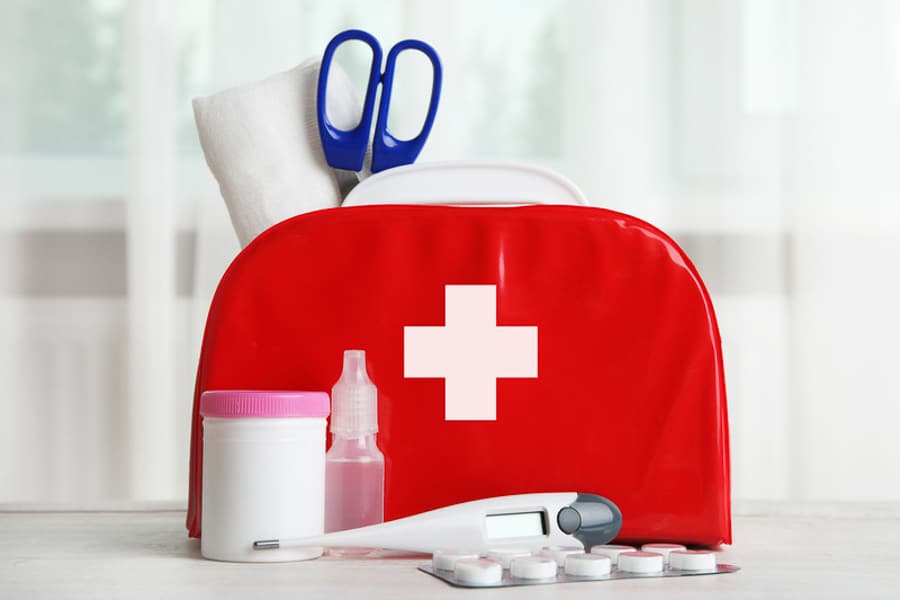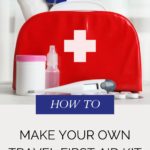
Last Update: November 27, 2023
You can certainly buy pre-packaged basic first aid kits at your local pharmacy or Amazon.
Table of Contents
Why make up your own first aid kit?
But, after giving it a good deal of thought (and having a few cuts and scrapes over the years) I decided to make up my own small first aid kit for a couple of reasons: It's ultimately cheaper than buying the pre-packaged variety; if I make it up myself, I know exactly what's in it; and, as I use up supplies, I can easily replenish it either on the road or from my medicine cabinet at home.
So, in other words, the best first aid kit for travel is one you make up yourself.
Based on my consultation with a registered nurse, here's what's in our homemade emergency travel medical kit:
What goes in your first aid kit
1. Adhesive bandages, i.e. Band-Aids, in various sizes:
Obviously, bandages are the first thing to go into your kit. Cuts and scrapes are the most common minor injuries, so a dozen or so bandages in various sizes are your best bet.
2. Gauze pads in a variety of sizes: These are the next level after the Band-aids. You can use them to soak up blood, apply pressure to stop bleeding, clean a wound, or whatever else you need to do. For a larger wound, protect the wound with the gauze pad and tape it down with adhesive tape or Band-Aids.
3. Adhesive (athletic) tape: It's good to carry a roll or two of medical tape to secure gauze if needed. This tape also is part of your blister kit, if you get those while hiking.
4. Small scissors: You can use these for cutting gauze and tape to the exact size you need. Be careful: depending on the scissors, you may have to check them when you fly so security doesn't take them from you. The round nose versions are safer and more likely to get through airport security in your carry-on bags.
5. Elastic or crepe bandage: If you have something bigger than a small cut, you might need one of these to hold your gauze dressing(s) in place until you can get to medical help. Also, these are good for light sprains, and, again, will help until you can get to a more permanent solution.
6. Tweezers: We actually like both the slant nose and pointed versions, but you probably only really need to carry one. They're good for splinters, and getting little bits of rock and other debris out of a wound. They also work for ticks, but be careful you remove ticks the right way.
7. Antiseptic wipes: Individutally wrapped antiseptic wipes are an essential precursor to clean a wound before applying your bandage or gauze.
8. Antiseptic and antibiotic ointment (Neosporin): A good idea for any cuts or scrapes to prevent infection. This is also an essential component of your blister kit.
9. Antihistamine or cortisone cream: Two words: insect bites. They aren't dangerous, probably, but they're annoying. These creams will alleviate the itch.
10. Pain relief medication: Take a small bottle of whatever pain relief meds you prefer. (We like ibuprofen.) A good idea is to buy a small bottle to carry in your kit, and refill it as necessary from a larger supply at home. It's probably not necessary, but having the meds in the original bottle might save you some trouble if the authorities want to have a look at your pills.
11. Sandwich size and quart size plastic bag: We carry a couple of spare plastic bags in our kit just in case we need to fill them with ice for bumps and bruises.
12. Anti-diarrheal medication (Imodium): One of the classic side effects of travel. It's good to be prepared for when it happens to you. Remember, these are for emergency use when you're in transit, and they won't cure your problem. Use them until you can get somewhere where you can rest up for a few days, and maybe get a prescription that will deal with the real cause of the problem.
13. Other optional items you might want to include: These aren't essential items, but you might want to add them to your kit: sterile gloves, safety pins, water purification tablets, an instant cold pack, and hand sanitizer.
Prescription medication
Of course, be sure you're carrying an adequate supply of your prescription medicines when you're traveling. When you are going to a foreign country, it's especially important to carry your medicines in their original containers so any foreign official who might want to have a look can easily verify that you're only carrying prescription meds. Also, if you have any pre-existing conditions, consider wearing a medical alert bracelet.
Other important medical information
If your injury or illness can't be handled by this basic emergency first aid kit, seek professional medical attention without delay. Your hotel staff can usually help with this. Another resource you shouldn't leave home without is the Allianz Travel Smart app. The Travel Smart app includes information on English-speaking medical assistance in most countries, as well as all United States consular info. In case of an emergency, the US Consulates can always direct you to the appropriate medical care and also help with any language barrier issues.
Of course, you should also be sure to have travel insurance. Your usual health insurance may not cover you when you're away from home.
And, it's always a good idea before you travel to any foreign country where there may be special medical concerns such as malaria, yellow fever, altitude sickness, motion sickness, rabies, etc. to make an appointment with your local travel clinic and get the latest information (and preventative medicine or vaccinations) that you may need before you go.
Up Your Travel Skills
Looking to book your next trip? Use these resources that are tried and tested by us. First, to get our best travel tips, sign up for our email newsletter. Then, be sure to start your reading with our Resources Page where we highlight all the great travel companies and products that we trust. Travel Accessories: Check out our list of all the accessories we carry to make getting there and being there a lot easier. Credit Cards: See our detailed post on how to choose the right travel rewards credit card for you. Flights: Start finding the very best flight deals by subscribing to Thrifty Traveler. Book your Hotel: Find the best prices on hotels with Booking.com. See all of the gear and books we like in one place on our Amazon shop.Got a comment on this post? Join the conversation on Facebook, Instagram, or Threads and share your thoughts!


